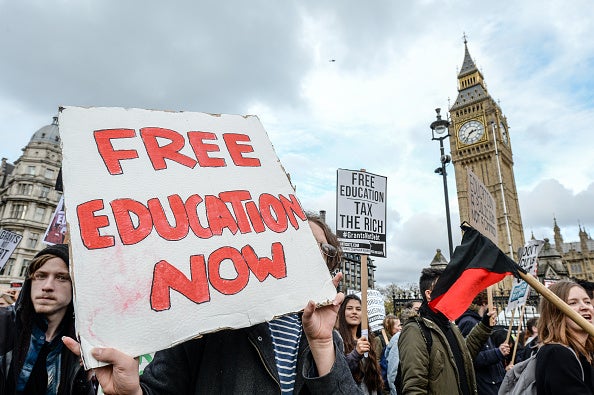White Paper: The Government has given the student movement an even greater opportunity for massive disruption
'The Government wants to deliver 'value for money' for students, a bold claim to make. The greatest value for money? An education system which requires students to pay no money at all'

The Government’s White Paper, published Monday, spells out a dark future for higher education (HE): private providers will be given help into the market while public universities are left to collapse, a Teaching Excellence Framework (TEF) will be introduced which is yet to prove that it is concerned about either teaching or excellence, and fees are set to increase over the next four years in another attempt to create a functioning market in HE. In short, the fundamental values of HE have been jettisoned, replaced by the values of the market - competition and choice.
The proposed TEF will distort, rather than improve, teaching in UK HE. As a student, I care deeply about the teaching I receive. However, I care very little for measuring teaching according to “student satisfaction.” I know, for example, that finding a course satisfying is very different from finding one intellectually challenging. I do not envy the teachers who will be faced with the choice between making their course challenging or making their course pleasant. They can either risk being scored low on satisfaction ratings and, potentially, risk their job - or they can sacrifice their intellectual integrity. Alongside the Prevent duty, it is not an overstatement to say this will chill debates in classrooms.
It is also deeply misguided to measure teaching according to the kinds of job graduates go into. Depressing as it is, I know I don’t have all that much control over the job I go into once I graduate. My teachers have even less control over it. In fact, they have almost no control over my future career prospects. I might well be working in a Costa in six months’ time, but I can guarantee my teachers won’t be the ones to blame. Yet, under current proposals, things totally out of teachers’ control - such as the health of the job market, the prestige of the university, or the social background of the graduate, factors which genuinely influence career prospects - will be used as a stick to beat them with.
Moreover, the White Paper tells us it is a sign of teaching excellence when “employers choose to sponsor some courses...because of the industry-relevance of their offerings.” Of course, there is nothing wrong with a course being relevant for industry. There is, however, something deeply problematic about employers throwing money at university courses.
In a climate in which universities are being starved of funds, employers have a greater ability to influence the content of courses and distort the kinds of courses which are taught. There is a risk of universities being reduced to service stations for employers. So much for students being “at the heart of the system.”
The Government has also said it wants to deliver “value for money” for students, a bold claim to make, given its commitment to raising tuition fees over the next four years. It goes without saying that the greatest value for money would be an education system which requires students to pay no money at all. Moreover, “student choice” seems to have been mistaken for “value,” while students’ voices have been ignored completely.
At the moment, democracy in universities is in a sorry state. Proposals in the White Paper look set to make this worse, with threats to students’ unions veiled behind the language of “accountability” and “transparency.” Though no allusions to the Trade Union Bill have been made this time round, there is no guarantee the proposed measures won’t take a similar form.
Most worryingly, the Government is preparing the HE system for the entry of private providers, and the exit of public ones. The focus on ramping-up competition between universities is part of their misguided ideological commitment to the market. Students at universities performing poorly in league tables can expect to see their institutions collapse and their courses close. They will be forced to move, potentially many miles away. Short of this, we can expect to see universities expand their marketing departments, close down smaller academic departments, and crack down on unionised staff - something already happening at London Metropolitan University. Any proposal to put “students at the heart of the system” must also put staff there too; the intensifying contradictions created by an artificial market in HE will do nothing of the sort.
Students are fed up, and we’re fighting back. At its National Conference in Brighton last month, the National Union of Students voted to organise a nationwide campaign to sabotage the National Student Survey as part of a wider strategy to oppose the Government’s HE reforms. The revelations in the White Paper will most likely accelerate this process. Already, two students’ union - at Sheffield Hallam and the University of Sheffield - have voted to actively join in the sabotage. Students at Warwick look set to do the same later this week, and it is expected that more students’ unions will follow suit soon after. In delaying the implementation of the TEF, the Government has given the student movement an even greater opportunity for massive disruption. We won’t miss it.
Twitter: @joshberlyne
Josh Berlyne is a University of Sheffield finalist and NCAFC national committee member
Subscribe to Independent Premium to bookmark this article
Want to bookmark your favourite articles and stories to read or reference later? Start your Independent Premium subscription today.

Join our commenting forum
Join thought-provoking conversations, follow other Independent readers and see their replies